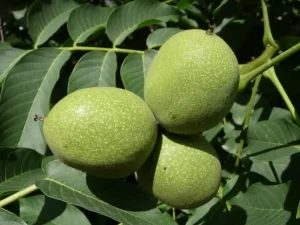It seems like every food item these days has the option of being organic or not. But do walnuts really need to be organic? If you’re looking for high-quality, nutritious walnuts, here are a few things to consider before making your purchase.
Organic vs Non-Organic
Organic walnuts are grown without the use of synthetic fertilizers, pesticides, and other chemicals that may be found in non-organic products. Organic farmers also practice sustainable farming methods and utilize natural soil amendments such as compost or manure to improve soil fertility and structure. Non-organic walnuts, on the other hand, may have been grown with conventional farming methods that involve the use of synthetic fertilizers, pesticides, and other chemicals.
Two Walnut Farmers transition their family to an organic farm and share some of the differences.
Nutritional Quality
When it comes to nutritional quality, there is no significant difference between organic and non-organic walnuts. Both types contain a good source of healthy fats, including omega-3 fatty acids which are essential for brain health. They also contain minerals such as manganese and copper which help support bone health. Additionally, both types provide a good source of fiber and plant protein which can help keep you feeling full for longer periods of time.
Environmental Impact
The environmental impact of growing organic vs non-organic walnuts is an important factor to consider when deciding which type is right for you. Organic farms generally have less negative impacts on the environment because they don’t rely on synthetic inputs such as fertilizers or pesticides that can contaminate groundwater or soil. Additionally, organic farms typically include more diverse crop rotations and cover crops which help reduce soil erosion while improving water quality in nearby streams and rivers. On the other hand, conventional farms often rely heavily on mono-cropping practices which can deplete topsoil nutrients over time and lead to increased runoff of chemicals into surrounding waterways. This is something that needs to be taken into consideration when weighing your options for buying walnuts.
Choosing whether or not to buy organic walnuts ultimately depends on your preferences when it comes to nutritional quality, environmental impact, and cost considerations. While there isn’t much difference in terms of nutritional value between organic and non-organic walnuts, there is a clear difference when it comes to environmental impact—especially if you choose to buy from a sustainably managed farm that utilizes natural inputs rather than relying solely on synthetic ones. Ultimately though, it’s up to you what type of walnut you decide is best for your needs!




